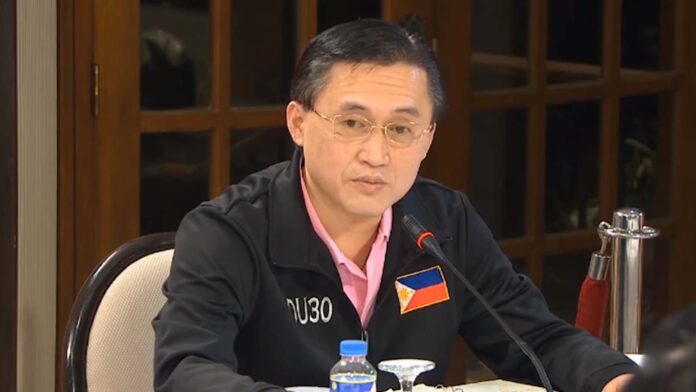Senator Christopher Lawrence “Bong” Go on Monday urged the Department of Information and Communications Technology and other concerned agencies to prioritize developing e-governance systems to make government more efficient, accessible, and responsive to the changing times.
“Sa panahon ngayon, lahat nagta-transition na (Right now, everyone transitions) to online—from E-governance, E-commerce and also online learning. Importante na hindi po maiwan ang bansa pagdating sa (It is important the country will not be left behind during) transition to the digital age,” Go said.
Go said the necessity for e-governance in the country has been growing in light of the current coronavirus disease (Covid-19) pandemic which limits physical mobility and face-to-face transactions among government offices, and between the government, citizens and businesses.
“Dahil sa Covid-19, kinailangan mag-evolve ang mga transaksyon na normally ay kailangang face-to-face. Importante rin na ang gobyerno ay mag transition na rin (Due to Covid-19, transactions should evolve from what normally done face-to-face),” Go said.
Go said e-governance will bring the government closer to the people in these times through modern platforms.
“Matagal nang hinaing ng ating mga kababayan ang lumang sistema ng kalakaran sa gobyerno. Simpleng permit o lisensya, ilang araw inaabot at kailangang pisikal na pumunta at pumila pa sa mga opisina ng gobyerno. Hindi na po pwede ‘yan ngayon (Our countrymen have been clamoring for change from old system of government transactions. Simple permits take day to process and you need to queue in government offices. That’s should change),” Go said.
He said health and safety protocols currently imposed to combat Covid-19 cannot allow usual ways of transacting with government.
Despite the fact that most regular private and public operations have been put to a halt due to the pandemic, he said people still need to transact with and avail of help from government.
“Let us aim for a ‘better normal’,” Go said. “Gamitin natin ang teknolohiya upang mas maging maayos at komportable ang buhay ng ating mga kababayan at masigurong ligtas sila sa oras ng pandemya (Let’s use technology to provide better and comfortable life for our people and make them safe during pandemic).”
Go cited various levels of governance where e-governance will prove to be useful. These include government-to-government (G2G), government-to-citizen (G2C), and government-to-business (G2B) interactions.
“Due to the pandemic, government-to-government (G2G) processes, such as transactions between two government agencies, are heavily hampered because we are physically limited by the social distancing and quarantine protocols in place to contain the spread of the virus,” Go said.
Go said Filipinos who need to transact with the government for public services will not need to go to physical offices if G2C e-governance platforms are available.
“Kung mayroon din pong e-governance platforms sa G2C level, hindi na po mahihirapan ang mga kababayan natin na mag-avail ng frontline services ng gobyerno lalo na’t hindi madaling lumabas ng ating mga kabahayan sa panahong ito (If there is e-governance platforms at G2C level, it would not be difficult for the people to avail of frontline services especially now that access outside is limited),” Go said.
Go also emphasized the need to build e-governance capacities in G2B transactions to ensure that the economic activity in the country remains seamless amid the current pandemic.
He said these undertakings will not be possible without swift and reliable internet access in the country.
The Philippines ranked 63rd out of 100 countries in the 2020 Inclusive Internet Index conducted by UK-based The Economist Intelligence Unit. The Index assesses internet availability, affordability, relevance, and readiness using multiple indicators.
“Nakakalungkot po ito isipin (This is unfortunate), because now, more than ever, a reliable and speedy internet connection has become integral in the everyday lives of our countrymen. This need exists not only in our urban centers but also in our rural and provincial areas as well,” he said.
As one of those who pushed for blended learning in the country which ensures the continuity of education for Filipinos through online and offline modalities, Go also said a speedy and reliable internet connection is an important element in ensuring the success of these efforts.
“I have also called on concerned agencies to thoroughly study the possibility of utilizing both online and offline learning, for the benefit of our youth,” he said.
Go said as early as the 2016 State of the Nation Address, President Rodrigo Duterte has called on the DICT to develop a national broadband plan to accelerate the deployment of fiber optic cables and wireless technology to improve internet speed and coverage.
“Have we addressed the President’s call? We want to find out the specifics, not just regarding the plans, but also regarding the progress we have made as a country when it comes to transitioning to E-governance,” Go said.
Go called on his fellow lawmakers to work together to support the sectors of society who rely heavily on reliable, fast internet access.
“Let us work together to help our countrymen, specifically the working class, our youth, our business sector, and all other Filipinos, who depend on reliable and fast internet access and other technologies, to realize this basic but important need, as we move forward towards a ‘better normal’ beyond this pandemic,” he said. (PNA)


